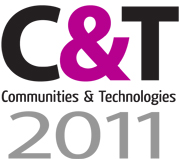Richard Medland
B IT (Hons I)
Connecting People to their Resource Consumption through Real-time Data Visualisation
PhD 2009-2012
Abstract
My research aims to inform the development of future generations of interface design solutions that help to conserve resources. The study is exploring more understandable and useful ways to use technology for people to make more environmentally conscious consumer decisions, and is guided by a human-computer interaction (HCI) research and design approach. It seeks to develop a set of interface guidelines that will improve the persuasiveness of design interventions and lead to more sustained behavioural changes towards sustainability in Australian cities.
The study’s timeliness and significance is supported by current trends, such as participatory culture, ubiquitous technology (small, embedded, and accessible), real-time information (sensor networks, locative media, and mobile devices), and the resultant challenges and opportunities that are emerging for the application of human-computer interaction on these platforms.
Currently my research encompasses two case studies. The first case study seeks to engender an attitudinal shift towards more informed domestic energy conservation, achieved through the installation of, and development work centred on, real-time in-situ electricity monitors in homes across Queensland. As Fitzpatrick & Smith (2009) report, domestic energy consumption remains largely invisible and intangible to consumers. To challenge this perception my research explores techniques to educate and interact with users, providing channels for personal expressions of creativity and methods to participate in and contribute to digital culture. Further, the study aims to encourage users to conduct their own research, and share, collaborate and compete naturally with others by applying their accrued energy data.
The second case study seeks to engender a greater understanding among university staff of the tangible and negative effects that excessive printing has on their workplace and local environment. Using software to analyse the generated log files of selected printers and printer groups, baseline measurements are determined and print usage of staff from suitable offices is graded. Different grades result in the circulation of software generated emails – purportedly from the local printer or printer group – playfully complaining or commending staff based on their pages printed. Staff are reminded of what their current usage equates to in different metrics, and encouraged to conserve paper for a tangible reward using disjunctive and injunctive information. Current planning envisages locally native saplings as rewards, temporarily situating them in the office reaching a set reduction target over time, before planting the saplings in a campus green space for staff to visit.
Biography
He worked in Portugal (2008) as a photographer documenting cultural history, and in New Delhi, India as Chief Analyst and IT Consultant for BuzzDrivers (2007-2008) visiting 37 locations across the subcontinent. He was awarded a place on the Dean’s List for Academic Excellent from the Faculty of Information Technology in 2006. Mr Medland was the first undergraduate to conduct research within Boeing Australia Limited (2006), investigating the corporate implementation of large scale information systems and electronic knowledge repositories.
Supervisors
Assoc. Prof. Marcus Foth (Principal)
Prof. Paul Roe (Associate)
Dr Ricky Robinson (NICTA/Industry supervisor)
Publications


